Maritime Risk Symposium 2024 – Great Power Competition and Gray Zone Engagement
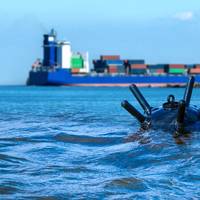
For 15 years the Maritime Risk Symposium (MRS), an annual three-day event, has brought together government and maritime industry leaders, port representatives, international and domestic researchers and solution providers to examine current and emerging threats to maritime security. World events highlight that maritime security is increasingly at risk during the current period of great-power competition and ongoing conflicts. The active competition between nations who are not…
14th Annual Maritime Risk Symposium to be Held Nov. 14-16 at SUNY Maritime
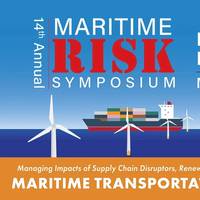
The 2023 Maritime Risk Symposium (MRS) will be held Nov. 14-16, 2023, as an in-person event, hosted by Maritime College, State University of New York (SUNY) at the Maritime Academic Center. The theme of the 14th annual event is “Managing Impacts of Supply Chain Disruptors, Renewable Energy, Emerging Technology on the Maritime Transportation System (MTS)” with a focus on offshore infrastructure risk and disruptors. Founded in 1874, Maritime College is the oldest maritime college in the United States, providing mariner training for 150 years.
Exploring All Too Real Maritime Risks
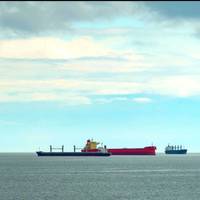
The 11th Annual Maritime Risk Symposium: A Virtual Event Exploring All Too Real RisksThe past year has been as impactful for the world’s maritime transportation xystem as it has been for the rest of society. From the Suez Canal to the Arctic and beyond, human, technology and environmental events disrupted maritime activity. And the pandemic highlighted supply chain vulnerabilities in many ways, from mariners quarantined aboard vessels to port congestion due to COVID-driven surges in e-commerce.
Maritime Risk Symposium 2020: Maritime Resilience in Black Swan Events
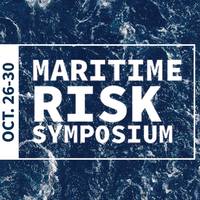
In 2007, scholar Nassim Nicholas Taleb, who holds a doctorate from the University of Paris, wrote a bestselling book titled “Black Swan,” which proposed a theory involving unpredictable events with significant impact. Taleb believed that a black swan event was an outlier with significant impact and, once it occurs, is the source of deep reflection and rationalization. Since the book’s publication, a significant number of research efforts have been developed to consider possible black swan events that significantly impact the Maritime Transportation System (MTS) and the Maritime Global Commons.
Coast Guard Auxiliary Supports Research Efforts

Unique among the nation’s armed services, the Coast Guard’s missions include national defense, law enforcement, natural disaster incident management, recreational boating safety and environmental protection. This diversity of mission scope presents opportunities for the Coast Guard at the strategic, operational and tactical levels as the service works to make their efforts as effective and efficient as possible.Contributing to the service’s overall execution effort is the Coast Guard Research and Development Center (RDC), based in New London, Connecticut.
Maritime Risk Symposium, Nov. 12-15 at SUNY Maritime
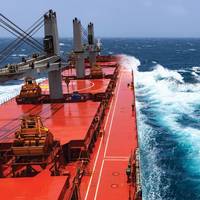
The State University of New York Maritime College, in collaboration with the U.S. Coast Guard, National Academy of Sciences, academic institutions, industry partners, and federal, state and local agencies, will host the 10th Annual Maritime Risk Symposium (MRS 2019) Nov. 13-15, 2019, at New York Maritime College located in the Bronx, New York.MRS 2019 will bring together academics, government and commercial entities to discuss the threats, challenges and risks associated with the Marine Transportation System with a focus on current and future marine transportation challenges and threats.
AI & Machine Learning, Possible Force Multipliers for the Coast Guard

Artificial intelligence (AI) and machine learning (ML): mention these two terms and the listener may instantly think of the ads displayed as you view your favorite online news site. This is one version of what AI/ML might be. Given the state of AI and ML research today, these advanced mathematical techniques represent something the U.S. Coast Guard should explore for mission application. To do this, common definitions need to be created, challenges understood, and practical use…
2018 Maritime Risk Symposium – Energy and Maritime Risk
Energy.It seems that energy touches every aspect of our lives from heating our homes to ensuring that fresh produce is available at grocery stores. It powers our cars and allows industry to move products around the world. The connection between energy and risk to the maritime environment has been a growing area of discussion, research and analysis. The United Kingdom’s Royal Navy, within its Joint Doctrine Publication (JDOP 0-10) 5th edition UK Maritime Power, captured this issue superbly: “Fossil fuels and minerals are an important resource in the maritime environment. New deposits of oil and gas, as well as mineral wealth, are discovered under the seabed each year, and improvements in technology will facilitate future exploitation.
Cyber Shoal Waters

Over the past two months the world has been rocked by three major hacking events that have garnered international notice. These included the EQIFAX event in which 140 million individuals were reported to be possibly compromised, the WannaCry attack and the NotPeyta event. In the past two years the emphasis on the cyber security of the Marine Transportation System, a vital economic cog to the world has come under increasing scrutiny. In August, trade journals and major international…
HiPer Craft Forum 2013: New Speakers Announced

The American Society of Naval Engineers (ASNE) will host the High Performance Craft (HiPer Craft) Forum on June 19-20, 2013 at the Half Moone Cruise and Celebration Center in Norfolk, Va. • Dr. • Dr. • Mr. • Mr. • Mr. Jonathan Hill, AMRINA, AFNI, Training Director at FRC International Ltd and Trident Marine Ltd. • CAPT D.B. • Mr. Dave Menna, Donald L. Blount & Associates, Inc. • Mr. • Dr. • Mr. • Dr. Trevor Dobbins, STResearch Ltd. • Mr. Tyler Brand, President, StrongWake Ltd. • Mr. • Ms. • Mr. Walt Pullar, Chief Executive Officer, RMGS, Inc.
Great Lakes Agencies Discuss Contingencies
Hosted by the US Coastguard, about three dozen Great Lakes agency leaders from the U.S. and Canada participated in a binational multi-agency meeting, at the Anthony J. Celebrezze Federal Building in Cleveland, to discuss various emergency preparedness and security issues concerning the Great Lakes region. The meeting, titled “Strategic Surprise: Sharing Solutions for the Great Lakes,” featured a presentation by homeland security expert Dr. Stephen E. Flynn, co-director of the Kostas Research Institute for Homeland Security at Northeastern University, and facilitated discussions by Dr. Joe DiRenzo III, the deputy operational planning and anti-terrorism coordinator for Coast Guard Atlantic Area. The event was hosted by Rear Adm. Michael N. Parks, 9th Coast Guard District commander.
International Ship and Port Facility Security (ISPS) Code
Closely associated with the Maritime Transportation Security Act of 2002 (MTSA) is the International Ship and Port Facility Security (ISPS) Code enacted by the International Maritime Organization (IMO). Implementation of the ISPS code will provide a comprehensive framework for global maritime security while facilitating the flow of commerce through the maritime transportation system. The 108 countries that comprise the IMO, including the U.S., adopted the ISPS code in December of 2002. The code, along with amendments to the Safety of Life at Sea (SOLAS) Convention, sets forth several functional requirements to achieve maritime security.
MTSA: Another Key Layer of Port Security
The Layered Defense. This classic military strategy has been used as a primary approach for defending a valuable target, infrastructure or piece of property for centuries. Medieval rulers had wide moats and drawbridges surrounding their castles, followed by high walls and armies ready with flaming arrows or large caldrons of hot metal ready to dump on the attacking force to slow their advances. Modern day security barriers are now a fixture at every U.S. embassy around the world. The idea of a layered defense has been a primary tactic that have served military commanders well. The layered defense strategy is also a cornerstone of security in the maritime arena, especially in the United States following the cowardly attack on the USS COLE.
Column: MTSA: Another Key Layer of Port Security
The Layered Defense. This classic military strategy has been used as a primary approach for defending a valuable target, infrastructure or piece of property for centuries. Medieval rulers had wide moats and drawbridges surrounding their castles, followed by high walls and armies ready with flaming arrows or large caldrons of hot metal ready to dump on the attacking force to slow their advances. Modern day security barriers are now a fixture at every U.S. embassy around the world. The idea of a layered defense has been a primary tactic that have served military commanders well. The layered defense strategy is also a cornerstone of security in the maritime arena, especially in the United States following the cowardly attack on the USS COLE.
65th Anniversary: A U.S. Coast Guard Mission Since 1917
The horrific attacks on 9-11, and the subsequent increase in maritime security required to protect against asymmetric maritime attacks, has dramatically changed the U. S. Coast Guard. They have changed the service's emphasis on port security as well as its ethos in the eyes of the nation it serves. Previously, the Coast Guard received national media attention mostly when it was involved in a dramatic at-sea rescue leaving a public perception of the service as lifesavers. Since 9-11, because of its port security efforts and its overall role in Homeland Security, the Coast Guard has received more national level public, political and media attention than at any other time in its long history and its public image is rapidly shifting from lifesaver to protector. Consider the following examples.
The Great Maritime Disruption… that Never Happened
Y2K. Remember the dire warnings four years ago as the world raced towards the stroke of midnight ushering in 2000? Editorials screamed that computer systems everywhere would fail making bank accounts inaccessible, traffic lights inoperable and the whole air traffic control system would come to a screeching halt leaving airplanes without guidance. Y2K disaster preparation "kits" were sold over the Internet as survivalists worried about governments all over the world failing and universal chaos occurring. Despite all these dire predictions from experts and average citizens alike governments, working in partnerships with industry (both large and small), took a very proactive approach, developed solutions and the great cyber meltdown never occurred.
America's Western River: A Unique Security Challenge
Since 9-11 all facets of the media have combined to focus national policy makers, in and out of government, along with the general public on the asymmetric terrorist threat facing the United States and its global trading partners. Lengthy newspaper articles or Op-ed pieces, documentaries on television such as The Learning Channel and the Discovery Channel, along with talk radio banter have spotlighted multiple areas of concern. These have included airplanes, tanker trucks, critical infrastructure and the country's bustling seaports such as New York and Los Angles. The maritime nexus in particular has received a lot of attention as over 90 percent of the nation's commerce travels by water.
Nanotechnology: The Next Frontier for Maritime Security?
Over 20 million shipping containers enter the U.S. each year, most onboard ships. These containers are the life blood of a national economy fed by an industry that depends upon the just-in-time delivery of goods and supplies rather than maintaining expensive inventories. Any actions that slow the flow of these containers will have a significant economic impact. Yet containers are very affordable, Council on Foreign Affairs’ Dr. Stephen Flynn noted in his book “America the Vulnerable” (Harper Collins), “The challenge of securing the loading and movement of containers is formidable. Anyone who has $3,000 to $5,000 can lease one of the many millions of containers that circulate around the globe.







